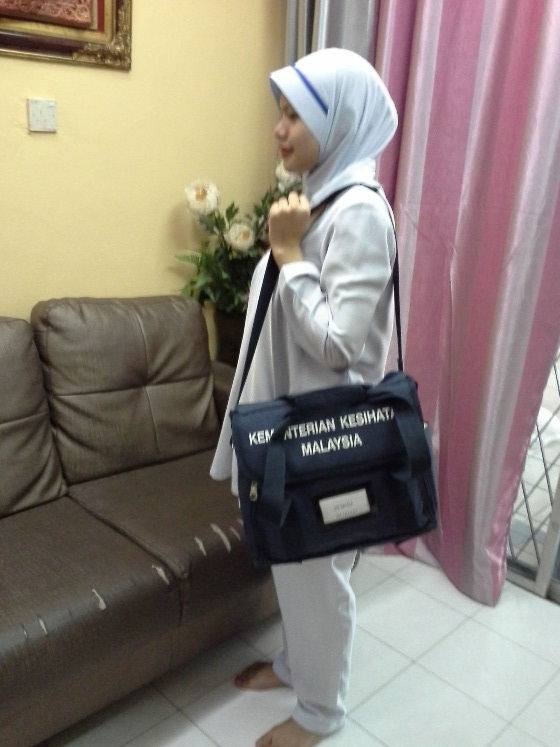Postnatal period is the time occurring after birth until the genital tract and uterus have returned to normal. It starts from the expulsion of the placenta (the third phase of childbirth) until the last 42 days, also known as the period of confinement.
Some hormonal changes during the postnatal period can affect the physical and emotional status of the mother. Postnatal care is necessary to ensure that mother and baby are in good health.
Postnatal care at home is provided to the mother free from risk on days 1, 2, 3, 4, 6, 8, 10, 15 and 20. For mothers suffering from high blood pressure, diabetes, heart disease and other medical condition; the postnatal care would be performed more frequently to detect early abnormal conditions or complications for prompt referral to the clinic or hospital if necessary.
How do nurses perform postnatal care at home?
Every delivery in a hospital, Alternative Birthing Centre (ABC) or at home should be notified to the nurse at the nearest health clinic so that postnatal care can be provided by a public health nurse or community nurse.

When will the nurse go for postnatal care at home?
The husband or family members must notify the nurse at the nearest health clinic /community clinic within 24 hours of discharge from the hospital. The nurse will then visit mother’s house according to the standard schedule of postnatal care visits. For mothers with no risk, the postnatal care at home will be performed on days 1, 2, 3, 4, 6, 8, 10, 15 and 20. While for high-risk mothers, postnatal care will be more frequent depending on the mother’s condition. At day 30, the mother must go to the health clinic for a postnatal check-up and family counselling planning should commence.
What procedures will the nurse perform during home visits?
During the home visit, the nurse will examine the mother and her newborn baby according to the existing standard operating procedures. If the nurse detects any abnormal condition of the mother and baby, they will treat it accordingly or refer the case to the health clinic or hospital.
Examination of the mother will consist of:
- General observation of the mother, including personal hygiene
- Vital signs examination will include:
- Body temperature, blood pressure, pulse rate and respiratory rate of the mother.
- The fundal height of the uterus is measured during each visit to detect involution of the uterus
- Breast examination to detect any abnormalities such as swollen, cracked nipples, inverted nipples or less flow of milk
- Observe mother while breastfeeding the baby and provide breastfeeding education/counselling
- Inspection of the genital/surgical wound if any
- Inspection of lochia to detect any abnormality, such as:-
- An excessive amount of red coloured blood indicates excessive bleeding and need of immediate referral to hospital.
- Brown coloured blood and odours indicate infection and should be referred to the clinic/hospital.
- Detect any signs and symptoms of deep vein thrombosis (blood clots in the veins of the calf) and Pulmonary Thromboembolism blood clot in the vessels in the lungs) such as chest pain, difficulty breathing, swelling and redness in the leg or calf.
- A check of the urination and pass stools.
- Mother is encouraged to pass urine within 6-8 hours after delivery for their comfort and for effective involution of the uterus.
- Mother is advised to have pass stools after 24 hours of birth. Treatment should be given if the mother does not have a bowel movement after 48 hours.
Examination of the baby
- Thorough examination includes;
- Body weight
- Body temperature
- Eye
- Jaundice
- Skin
- Cord/Umbilical
- Urination and defecation
Health education should be given such as:
- Breastfeeding
- Care of newborns
- Detection of jaundice in infants
- Nutrition during postnatal care
- Hygiene
- Episiotomy wound care / surgical wound care
- The importance of taking medication regularly
- The aim of early exercise and early ambulation during the postnatal period is to allow blood flow, restore muscle tone and blood supply to the reproductive organs
- Examples of early exercise and ambulation include:
- Light postnatal exercise
- Pelvic floor exercise
- Family Planning
- The importance of follow-up visits to the clinic
Do the nurses discuss with the mother/husband/family member the findings of the mother’s health examination results?
Every finding of the examination, either normal or abnormal, should be discussed with the mother/husband/family member. If necessary, referral to the Medical Officer of the health clinic or hospital will be made. Therefore, the involvement and cooperation from husband/family member is needed. This ensures that the mother/husband/family member understands the health condition and participates in optimal care.
Are there any charges for postnatal nursing care at home?
Postnatal care services at home are free for all Malaysian Citizens.
Fees are only charged to non-Malaysian citizens according to the Medical & Cost of Services Act 2014
References
- Perinatal Care Manual 3rd Edition. 2013. Ministry of Health Malaysia
- Garis Panduan Pusat Bersalin Alternatif (ABC) di Klinik Kesihatan, Bahagian Pembangunan Kesihatan Keluarga, Kementerian Kesihatan Malaysia, 2013
- Modul Latihan Ulangkaji Jagaan Kesihatan Ibu & Kanak-kanak Untuk Jururawat Kesihatan, Bahagian Pembangunan Kesihatan Keluarga, Kementerian Kesihatan Malaysia, 2010
| Last Reviewed | : | 23 August 2019 |
| Writer/Translator | : | Noor Aini bt. Karimon |
| Accreditor | : | Dr. Hj. Mohamed Hatta bin Mohamed Tarmizi |
| Reviewer | : | Dr. Rafaie bin Amin |







